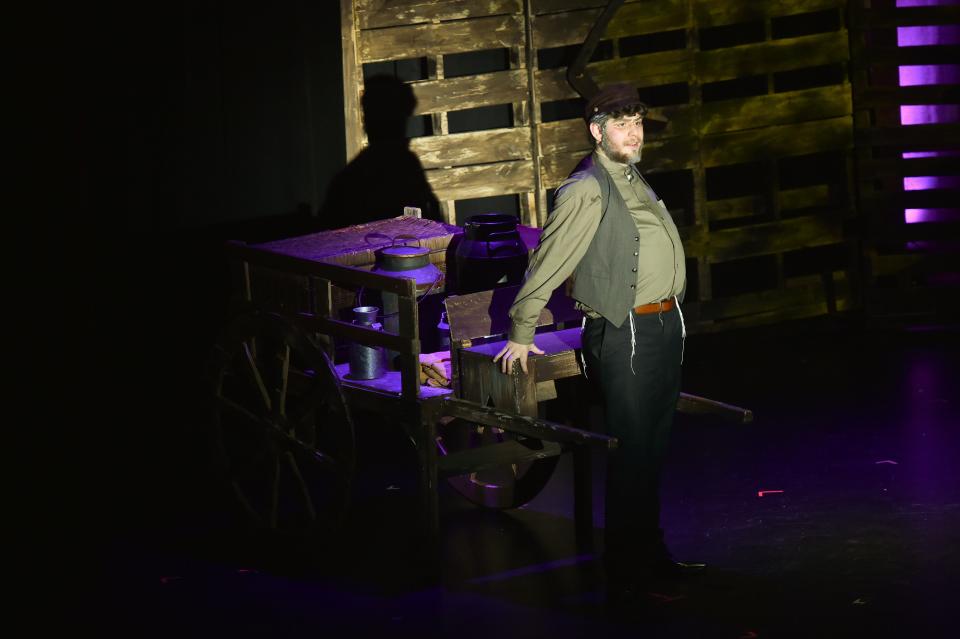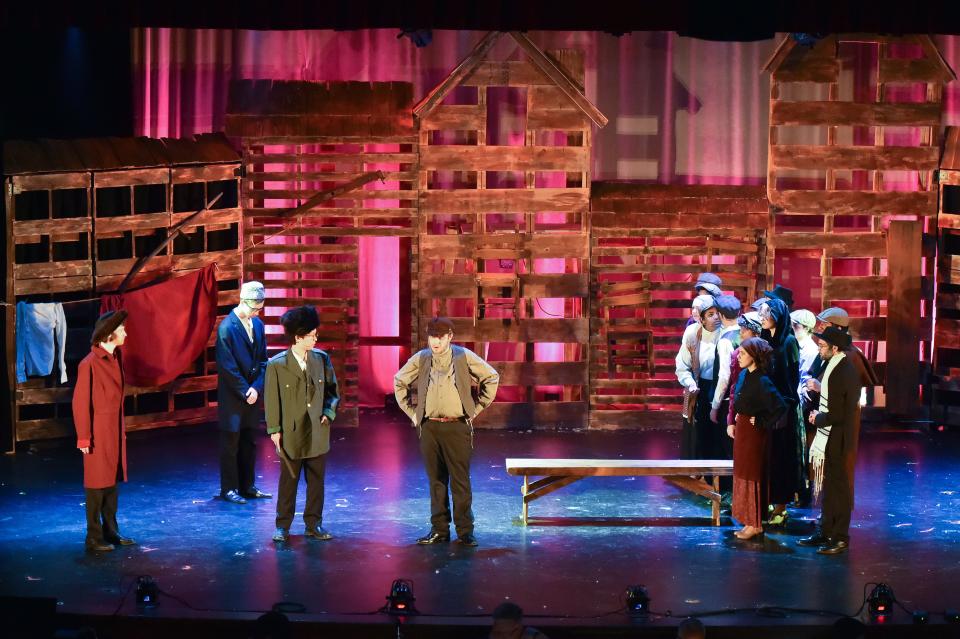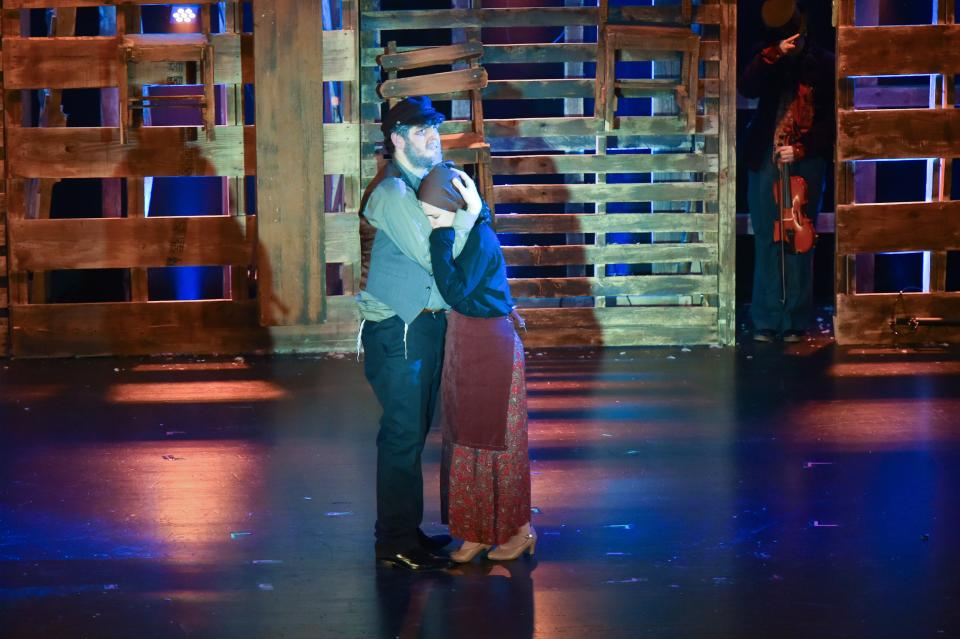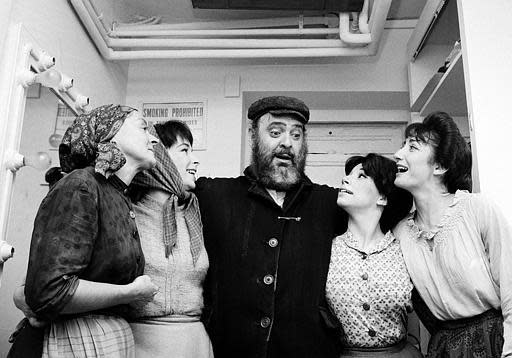How Broadway's "Fiddler on the Roof," set in Ukraine, is newly relevant
- Oops!Something went wrong.Please try again later.
"Fiddler on the Roof" is a family saga. It's Broadway's salute to its own Jewish roots. It's the last of the old-school musicals — or the first of the modern ones.
People have pondered "Fiddler on the Roof" for 58 years. But very few, until now, have given much thought to the setting of the show — the little (fictional) village of Anatevka, in the so-called "pale of settlement" in Ukraine.
Nowadays, that's the first thing anybody thinks of.
"The week after Russia invaded, I felt it was important to talk about it with the cast," said Scott Patteson, theater arts teacher at Livingston High School, and director of the school's "Fiddler on the Roof," which ran March 17 to 19.
Livingston is one of several New Jersey schools that have staged, or are in the process of staging, the classic musical since Vladimir Putin sent his troops into Ukraine on Feb. 24.

Malcolm E. Nettingham Middle School in Scotch Plains recently did the "junior" version — 60 minutes, suitable for the lower grades. Charles DeWolf Middle School in Old Tappan is doing it April 1 and 2.
"We've seen an increase in requests to perform the show in schools and community theaters, and to produce concerts of 'Fiddler' songs," said Drew Cohen, president and CEO of Music Theatre International, which licenses the show. World events have thrust it back into the limelight.
"With the war in Ukraine — where 'Fiddler' actually takes place over 100 years ago — the story comes full circle, with Ukrainians being uprooted from their homes, businesses and cities," Cohen said.

Through a new lens
"Fiddler" is not only being done more, it's being done in a different spirit.
"We sort of had a moment of silence," Patteson said. "I asked the cast if they were aware of what was going on, and most of them were. Then we talked about the parallel between 1905 and the Ukraine of today. I think it renewed our sense of purpose when this all went down."
Their production, which featured a cast of 45, a 22-piece orchestra and some 30 people backstage, showed this heightened consciousness in a lot of small ways. For instance, the pronunciation of Ukraine's capital.
It's "Kiev" ("KEY-EV") in the script — an outdated Soviet-era transliteration that Ukrainians have been actively discouraging since the country won its independence in 1991. These days, as we all know, it's rendered "Kyiv" ("KEE-EVE"). And that's how the kids in Livingston pronounced it.

"It was just a small symbol of solidarity we felt would honor the people over there," Patteson said.
Which led to a slight problem. The word Kiev, in "Fiddler on the Roof," is not only spoken, it's sung. And because Kiev — unlike Kyiv — is two syllables, composer Jerry Bock gave it two notes.
In the end, they had to split the difference. "We couldn't alter the music," he said. "So it's two syllables in the music, but whenever we said it in a line of dialogue, we changed the pronunciation."
Such pains were worth taking. "Kyiv," a name ripped from today's headlines, lends an immediacy to a story that might have happened 100 years ago — or might be happening right this very minute.

"We're telling real people's stories," said Jonah Ruderman, 16, the junior who played the lead character, Tevye.
"I did major research about the show, and I saw a lot of different versions," he said. "I saw some versions where Tevye was really funny. This was about coming back to that real place. This is really happening. A lot of people have had to leave their families."
Entertainment news:
Did you know these famous movies, shows, and people have a Ukraine connection?
Cervelli: 'Fiddler on the Roof' is still an American musical treasure
'Quite the gossip': 'Music Man' character was inspired by NJ woman's grandmother
The more things change
Back in 1905, of course, it was not Putin's troops but the czar's military who were the bad guys.
It was they who forced the long-suffering Teyve, the Jewish dairyman, out of the village where he lived with his hard-headed wife, his marriage-minded daughters and his none-too-solid traditions.
But the reaction of Ukrainians would appear not to have changed much.
"I have some advice for you," Tevye tells the Russian constable. "Get off my land. This is still my home, my land. Get off my land."
"It's very timely, because people are being kicked out of their homes," said Jayden Declet, 16, a junior, who played the daughter Hodel. "These were not just characters we were playing. People are experiencing what happened to us in our show, in a different part of the world, right now."
The timing of this "Fiddler," said director Patteson, was total coincidence. It was approved in the late summer of 2021, announced in September and cast in December — before the Ukraine invasion was a blip on the radar.

The initial excitement, Patteson said, was that this would be the school's first big-scale, indoor show in three years, because the pandemic shut everything down in March 2020. "Shrek," scheduled to go on that month, had been canceled outright. "The 25th Annual Putnam County Spelling Bee," the next year's musical, was staged outdoors.
For the school's big return-to-normal show, Patteson wanted a favorite — something surefire, a bit of musical comfort food. And what could be more comforting than "Fiddler on the Roof": the classic 1964 musical with its hit songs like "Sunrise, Sunset," "If I Were a Rich Man," "To Life," and "Miracle of Miracles"?
Can you relate?
The show, which has been staged in France, England, Spain, Italy, Israel, Germany and dozens of other places, has a history of resonating with everyone, everywhere.

A junior high school in Brooklyn, with a largely African American and Puerto Rican student body, staged it in 1968 — those kids could relate to it, too. In 1967, the show was a hit in Japan. A famous story concerns a Japanese theatergoer who asked whether "Fiddler" had been a hit in America. Yes, he was told. "But it's so Japanese!" he said.
For Livingston, a school that happens to have a lot of Jewish students, and students of Russian descent, it was an easy choice. "I wanted to really bring people back into the theater," Patteson said. "I wanted something to invigorate the community. Something that would resonate."
"Fiddler," in March 2022, resonated in ways he could never have foreseen.
"I have a Russian background, my mom's family is from Russia, so doing this show at this time was especially relevant," said junior Leah Waessa, 16, who played Tevye's wife, Golde. "I sort of connected my role with my family right now, because they're going through a lot of hardship."
"Fiddler" is set in imperial Russia, at a time when that encompassed parts of Ukraine, Lithuania, Moldova, and sundry other countries. The "pale of settlement," established by Catherine the Great in 1791, was the area where Jews were allowed to live. Their descendants live there today. At present, there are — or were — some 200,000 Jews in Ukraine, including its current president, Volodymyr Zelenskyy. The fact that he himself was an actor is a kind of benediction for "Fiddler," Patteson believes.
"He used to be an entertainer," Patteson said. "He's a former artist."
Certainly, it would be hard to watch a production of "Fiddler on the Roof" now, with all the villagers moaning "Anatevka, Anatevka" as they trudge out of the town they've been forced to leave, and not think about Mariupol, Volnovakha and other places in the news.
Tale of a town
That said, Patteson had to be careful not to make Russians, per se, the villains of his piece. Now, as then, the Russian people have very little say in what their leaders do. Many in Russia are actively opposed to Putin's war. Many more, because of censored state media, have no idea what's really going on.
"We have a lot of kids of Russian descent here," he said. "It's important for them not to feel vilified. I wanted that to be clear."
Curiously, although Tevye's creator, writer Sholem Aleichem (born Solomon Rabinovich in 1859), himself came from in Pereiaslav, in what is now central Ukraine, the show's "little village of Anatevka" seems to be mostly the creation of "Fiddler's" librettist, Joe Stein. Tevye's village, if he has one, is never mentioned in the original stories. "Anatevka" comes up only once, in passing, as a neighboring town.
But Anatevka has taken on a life of its own since "Fiddler" made its Broadway bow on Sept. 22, 1964. Since 2014, there has been a real Anatevka in Ukraine — a town created as a refuge for Jewish families (Rudolph Giuliani is the honorary mayor, but that's another story).
"Fiddler's" creators clearly wanted to make this the tragedy not just of a single family, but of a whole community, a whole people.
Maybe that's why the show seems so apropos now — when we see villages and cities being evacuated every night on the news.
"It can be difficult to relate to something that isn't about your own culture," said Collin Eagen, 17, a senior who played the revolutionary Perchik.
"Having something like this now was really helpful to understanding what these characters are going through," he said. "This is timeless."
Jim Beckerman is an entertainment and culture reporter for NorthJersey.com. For unlimited access to his insightful reports about how you spend your leisure time, please subscribe or activate your digital account today.
Email: beckerman@northjersey.com
Twitter: @jimbeckerman1
This article originally appeared on NorthJersey.com: Ukraine makes "Fiddler on the Roof" newly relevant in NJ schools

